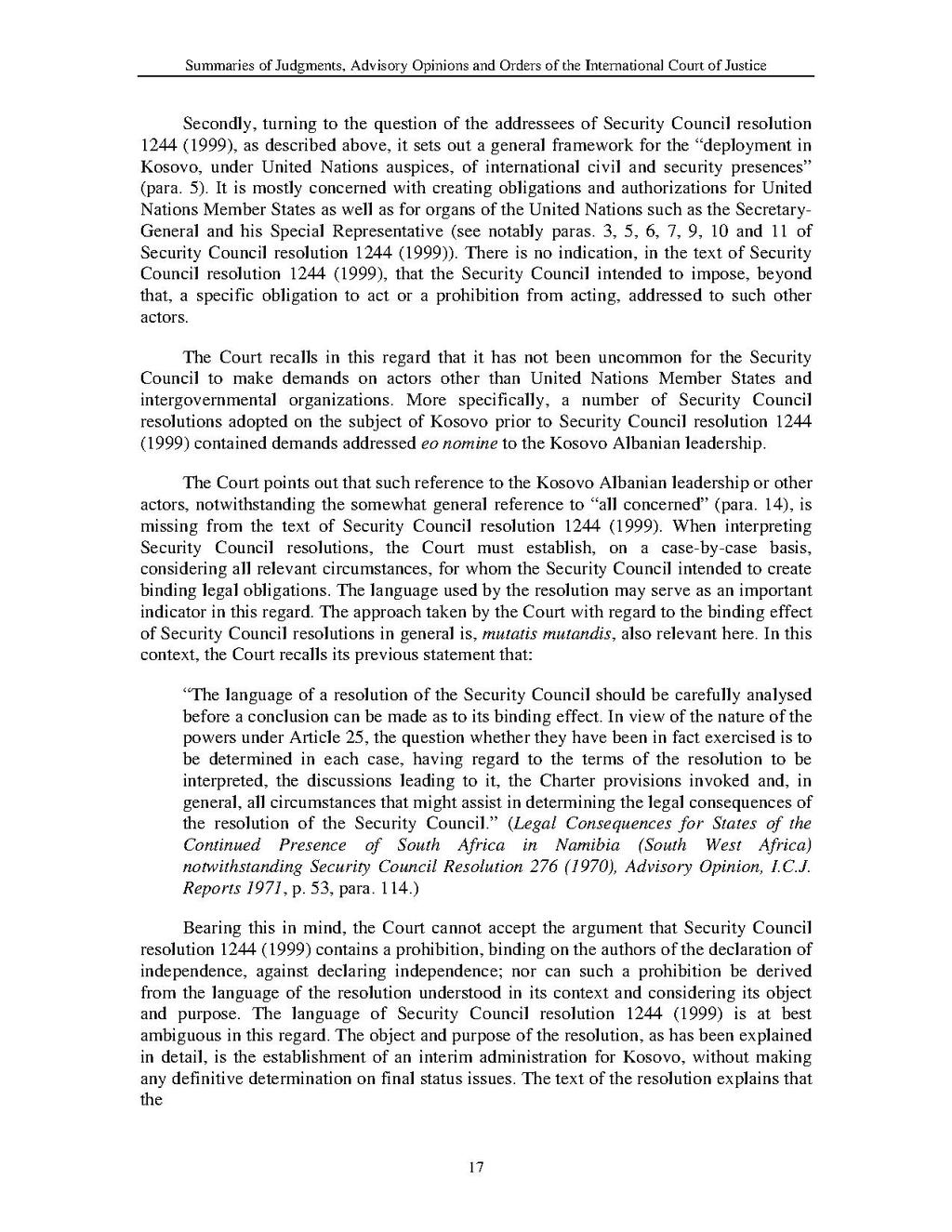Summaries of Judgments, Advisory Opinions and Orders of the International Court of Justice
Secondly, turning to the question of the addressees of Security Council resolution 1244 (1999), as described above, it sets out a general framework for the "deployment in Kosovo, under United Nations auspices, of international civil and security presences" (para. 5). It is mostly concerned with creating obligations and authorizations for United Nations Member States as well as for organs of the United Nations such as the SecretaryGeneral and his Special Representative (see notably paras. 3, 5, 6, 7, 9, 10 and 11 of Security Council resolution 1244 (1999)). There is no indication, in the text of Security Council resolution 1244 (1999), that the Security Council intended to impose, beyond that, a specific obligation to act or a prohibition from acting, addressed to such other actors.
The Court recalls in this regard that it has not been uncommon for the Security Council to make demands on actors other than United Nations Member States and intergovernmental organizations. More specifically, a number of Security Council resolutions adopted on the subject of Kosovo prior to Security Council resolution 1244 (1999) contained demands addressed eo nomine to the Kosovo Albanian leadership.
The Court points out that such reference to the Kosovo Albanian leadership or other actors, notwithstanding the somewhat general reference to "all concerned" (para. 14), is missing from the text of Security Council resolution 1244 (1999). When interpreting Security Council resolutions, the Court must establish, on a case-by-case basis, considering all relevant circumstances, for whom the Security Council intended to create binding legal obligations. The language used by the resolution may serve as an important indicator in this regard. The approach taken by the Court with regard to the binding effect of Security Council resolutions in general is, mutatis mutandis, also relevant here. In this context, the Court recalls its previous statement that:
"The language of a resolution of the Security Council should be carefully analysed before a conclusion can be made as to its binding effect. In view of the nature of the powers under Article 25, the question whether they have been in fact exercised is to be determined in each case, having regard to the terms of the resolution to be interpreted, the discussions leading to it, the Charter provisions invoked and, in general, all circumstances that might assist in determining the legal consequences of the resolution of the Security Council." (Legal Consequences for States of the Continued Presence of South Africa in Namibia (South West Africa) notwithstanding Security Council Resolution 276 (1970), Advisory Opinion, I.C.J. Reports 1971, p. 53, para. 114.)
Bearing this in mind, the Court cannot accept the argument that Security Council resolution 1244 (1999) contains a prohibition, binding on the authors of the declaration of independence, against declaring independence; nor can such a prohibition be derived from the language of the resolution understood in its context and considering its object and purpose. The language of Security Council resolution 1244 (1999) is at best ambiguous in this regard. The object and purpose of the resolution, as has been explained in detail, is the establishment of an interim administration for Kosovo, without making any definitive determination on final status issues. The text of the resolution explains that the
17
